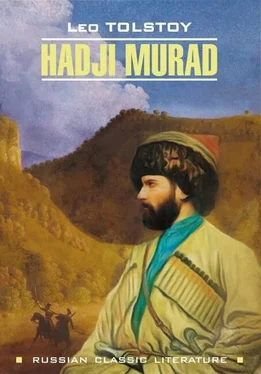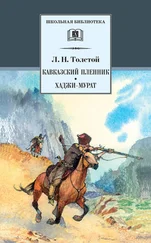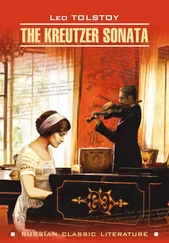The party ended with drinking and singing. Ivan Matveevich, who was very drunk and no longer red, but pale and grey in the face, sat astride a chair cutting down imaginary enemies with his drawn sword; he was swearing, laughing, embracing people and dancing to his favourite song “In years gone by Shamil rose up, Ho-ro-ro, Shamil rose up”.
Butler was also present. In this, too, he tried to see the romance of military life, but deep down he felt sorry for Ivan Matveevich, though there was no way of stopping him. And Butler, feeling slightly drunk, quietly left and set off home.
A full moon was shining on the white houses and on the stones in the road. It was so light you could see every small stone, every piece of straw and dung on the road. As he approached thc house Butler met Marya Dmitrievna wearing a shawl over her head and shoulders. After the rebuff she had given him Butler had rather shamefacedly avoided her. But now in the moonlight and under the influence of the wine he had drunk Butler was glad to meet her and tried again to make up to her.
“Where are you going?” he asked.
“To see what the old man is up to,” she answered amicably. She had been quite sincere and positive in her rejection of Butler’s advances, but she was displeased that he had been avoiding her of late.
“What’s the point of going after him? He’ll get home.”
“But will he?”
“If he can’t, they’ll carry him.”
“That’s just it, and it really isn’t good enough,” said Marya Dmitrievna. “You think I shouldn’t go then?”
“No, I shouldn’t. We had best go home.”
Marya Dmitrievna turned back and began walking to the house with Butler. The moon was so bright that around their shadows moving along the roadside was a moving halo of light. Butler watched this halo round his head and wanted to tell Marya Dmitrievna hat he found her as attractive as ever, but did not know how to begin. She waited for him to speak. Walking thus in silence they had almost reached the house when round the corner appeared some horsemen. It was an officer and escort.
“Who on earth is that?” said Marya Dmitrievna, stepping to the side. The moon was behind the officer and it was only when he was practically level with them that Marya Dmitrievna saw who it was. The officer was Kamenev, who served at one time with Ivan Matveevich and so was known to Marya Dmitrievna.
“Peter Nikolaevich,” she said. “Is that you?”
“In person,” said Kamenev. “Ah, Butler! How are things? Not asleep yet? Walking out with Marya Dmitrievna, are you? You look out or you’ll catch it from Ivan Matveevich. Where is he?”
“You can hear him,” said Marya Dmitrievna, pointing to where there was the sound of singing and a bass drum. “They’re having a binge.”
“Your chaps, is it?”
“No. A column is in from Khasav-Yurt and they’re giving them a party.”
Ah, a good thing. I’ll get to it myself. I only want to see him for a minute.
“Is something up?” asked Butler.
“Just a small matter.”
“Good or bad?”
“Depends who for. It’s good for us, but tough on others.” And Kamenev laughed.
The couple walking and Kamenev had meanwhile reached Ivan Matveevich’s house.
Kamenev called one of the Cossacks:
“Chikhirev! Here!”
A Don Cossack moved forward from the rest and came up to them. He was in the ordinary Don Cossack uniform, wearing knee-boots and greatcoat, and had saddlebags slung at the back of his saddle.
“Get it out,” said Kamenev, dismounting.
The Cossack also got off his horse and from one of the saddlebags drew out a sack with something in it. Kamenev took the sack from the Cossack and put his hand in it.
“Shall I show you the latest, then? You won’t be frightened?” he said, turning to Marya Dmitrievna.
“What is there to be afraid of?” said Marya Dmitrievna.
“There you are then,” said Kamenev and he pulled out a man’s head and held it up in the moonlight. “Do you recognize him?”
It was a shaven head, with prominent bulges of the skull over the eyes, trimmed black beard and clipped mustache; one eye was open, the other half-closed; the shaven skull was split and hacked about and the nose covered with black clotted blood. The neck was wrapped in a bloody towel. Despite all the wounds on the head, there was in the set of the now blue lips a childish, good-natured expression.
Marya Dmitrievna took one look and without a word turned and went quickly into the house.
Butler could not take his eyes off the terrible head. It was the head of that same Hadji Murad with whom he had recently spent his evenings having such friendly chats.
“How did it happen? Who killed him? Where?” he asked.
“He tried to make a break for it and they caught him,” said Kamenev, and handing the head back to the Cossack he went into the house with Butler.
“He died like a real man,” said Kamenev.
“But how did it all happen?”
“Hang on a minute. When Ivan Matveevich comes I’ll give you all the details. That’s what I’ve been sent for. I have got to go round all the forts and villages showing them.”
Ivan Matveevich had been sent for and came back to the house drunk, with two other officers also much the worse for drink, and began embracing Kamenev.
“I have come to see you,” said Kamenev. “I have brought you the head of Hadji Murad.”
“Go on with you! Has he been killed?”
“Yes, he tried to escape.”
“I always said he would do us down. Where is it then? His lead – let’s see it.”
The Cossack was called and came in with the sack containing the head. The head was taken out, and for a long time Ivan Matveevich gazed at it with his drunken eyes.
“He was a fine fellow just the same,” he said. “Let me kiss him.”
“He was a daredevil chap, that’s a fact,” said one of the officers.
When they had all inspected the head they gave it back to the Cossack. The Cossack replaced it in the sack, dropping it carefully so as not to bump it too hard on the floor.
“What do you do, Kamenev – do you say something when you show it round?” asked one of the officers.
“But I want to kiss him,” shouted Ivan Matveevich. “He gave me a sword.”
Butler went out on to the porch. Marya Dmitrievna was sitting on the second step. she looked round at Butler and at once turned angrily away.
“What’s the matter, Marya Dmitrievna?” Butler asked.
“You are just a lot of butchers. You make me sick. Butchers, that’s what you are.”
“It can happen to anyone,” said Butler, not knowing what to say. “That’s war.”
“War!” cried Marya Dmitrievna. “What’s war? You are butchers, and that’s all there is to it. A dead body should be decently buried and they make mock of it. Butchers, that’s what you are!” she repeated and went down the steps and into the house by the back door.
Butler went back to the parlor and asked Kamenev to tell hint in detail what had happened.
And Kamenev told him.
It happened like this.
Hadji Murad was allowed to go riding in the neighborhood of the town provided that he went with a Cossack escort. There was only one troop of Cossacks altogether in Nukha; of these a dozen were detailed for staff duties and if, according to orders, escorts of ten men were sent out it meant that the remaining Cossacks had to do duty every other day. Because of this, after the first day when ten Cossacks were duly sent out, they decided to send only five men, at the same time requesting Hadji Murad not to take his whole party of nukers. However on 25 April all five of them accompanied Hadji Murad when he set off for his ride. As Hadji Murad was mounting, the commandant noticed that all five nukers were preparing to go and told Hadji Murad that he could not take then1 all, but Hadji Murad, appearing not to hear, spurred his horse, and the commandant did not insist. One of the Cossacks was a corporal, Nazarov, who had the St George’s Cross, a young, healthy, fresh-faced fellow with light-brown hair cut in a fringe. He was the oldest child of a poor family of Old Believers; he had grown up with no father and kept his old mother, three sisters and two brothers.
Читать дальше
Конец ознакомительного отрывка
Купить книгу












